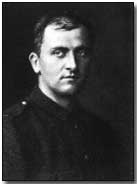Prose & Poetry - Thomas Hulme
 Thomas Ernest Hulme
(1883-1917), the soldier-poet, was born in Staffordshire.
Thomas Ernest Hulme
(1883-1917), the soldier-poet, was born in Staffordshire.
Hulme's characteristic conduct and outlook upon life has been variously described as 'robust' and 'argumentative'. It certainly brought its fair share of complications. Hulme's studies at Cambridge University were interrupted in 1904 (twice in total) by his being sent down for rowdy behaviour.
In 1906-07 he resolved to work his passage to Canada where he was to busy himself in manual labour on farms and lumber-camps. Upon his return to Britain Hulme established a reputation as an authority on Henri Bergson, translating the latter's works.
At the heart of the avant-garde English set of the early years of the century Hulme's reputation today largely rests upon his strong influence upon such eminent writers as Wyndham Lewis, Ezra Pound and T.S. Eliot. Hulme, along with Pound, founded Imagist poetry with its steadfast contempt for romanticism and preference for clear visual images.
Hulme's own poetical output was modest. In 1912 he somewhat wryly published The Complete Poetical Works of T.E. Hulme - comprising all five poems (increased to a total of six by the time of his death).
The outbreak of war in 1914 saw Hulme volunteer for service with the infantry on the Western Front. Wounded in 1916 he was killed by a shell-burst in Nieuport, Belgium, following his return to the Front with the Royal Marines Artillery on 28 September 1917.
Hulme's essays were posthumously published in collected form by Sir Herbert Read as Speculations in 1924 and Notes on Language and Style in 1929. His prose is better recognised today than his work as a poet.
German losses at Messines were 25,000, of which 7,500 were taken prisoner. British casualties were 17,000 killed or wounded.
- Did you know?
